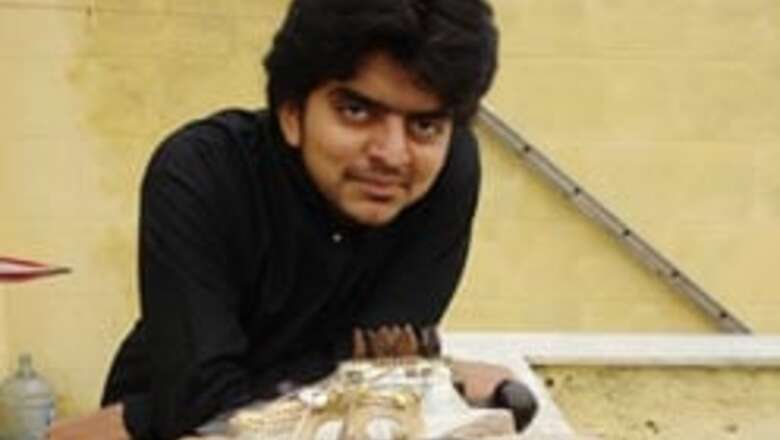
views
New Delhi: "I get high on music, good music," says Suhail Yusuf Khan, 20, wearing jeans and a T-shirt, no chains, rings or ear-ring, short, slightly-in-need-of-a-trim hair (or maybe that’s his style) and kohlapuri chappals." He mentions he dances too, "full-on, especially on drum and bass," he says as we sit on a rather windy terrace, talking about his impending trip to London. He is going there to make music – on his sarangi – with award-winning music producer-composer-DJ Nitin Sawhney.
Suhail is also part of Advaita, one of the music circuit’s well-respected raga-rock bands who marry Hindustani classical music with Western instruments. In the band’s own words, "the drone of Suhail’s sarangi is a crucial part of Advaita’s sound." Now, he wants to take the sarangi to the world…by combining it with electronic music. Suhail will be recording - number of tracks not decided yet – with Sawhney, State of Bengal, Gese (an artiste with Nasha records, another underground record label) and will also work on a project called Sarangi Electronica, which will feature different artistes like Talvin Singh, Karsh Kale, Swati Natekar…
Why the sarangi though? "It’s one of the toughest instruments to learn with 35-40 strings… and it’s in the family," says Suhail, the eighth generation of gharanedar (Sainiya Gharana of Rampur- Moradabad) sarangi players: he is the grandson of sarangi maestro, Padmashri Ustad Sabri Khan. And in collaborating with new age musicians like Sawhney, Suhail is taking forward a family legacy: Ustad Sabri was the first to bring the sarangi on to the world stage in the US and Europe.
"My nanaji says that in his time, the number of sarangi players matched the number of guitar players today. Where did they go? My grandfather did his bit by performing with the Beatles and others…now it’s my turn to do whatever I can," he says as earnestly as a 20-year-old in jeans, kohlapuri chappals and in need of a trim can say. And that’s unadulterated earnest, backed by previous results. The world is no new stage for Suhail.
He’s been touring all over England and Europe with his grandfather as a 10-year-old and has already performed live with guitar god Steve Vai and king of the Asian underground sound, Talvin Singh. In fact it was while performing with Talvin in 2006 – that would be as recent as last year – that the completely-classical Suhail got hooked to electronica. Since then he has already worked with electronica band Tatva Kundalini for their album Raaga Lounge (Chillom Records), regularly performs with some Delhi DJs and listens to Chemical Brothers, Infected Mushroom and Massive Attack.
An Aquarian who does not believe in planning life and going with the flow, Suhail does want to flow in a certain direction though: "I want to make music and release it all over the world; this traditional instrument should be exposed before the world. My family has been experimenting for a while, this is my way," says Suhail.
'I wrote Miliha for this girl I liked… Miliha in Arabic means the ‘most beautiful girl in the universe’. Of course she wasn’t, but I thought so then.'
'Desert Rain, it’s an instrumental, I really like it. It’s an angry track because I was angry at my parents… I was just 17 then. So I didn’t get good marks and they were saying the usual what-will-you-do-in-life thing, and I was really upset.'
'Whenever something happens or is happening, it’s as if a melody is running in my head. So it’s the general environment and nature that gives me ideas.'
'I debuted incognito, in a garage rock festival. As I got on stage, I kept thinking: What will I do amidst these guitar players? People would throw bottles at me. But after the show, people came up to me to ask me about the sarangi. And I was like yes, this is the crowd I have to talk to.'
'When I played for the first time in school, everyone was like ‘What kind of violin is that?’ And I had to tell them, Dude, this ain’t a violin, it’s a sarangi.'

















Comments
0 comment